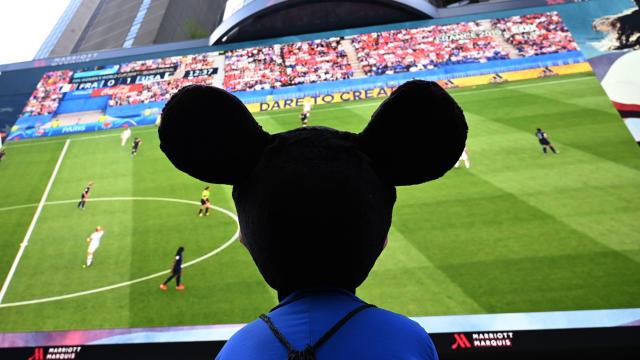Disney’s doing more than expanding its increasingly expansive empire into all aspects of media, it’s now thinking of getting into the gambling game. Strap some beers to your Mickey Mouse ears hat and start chugging, because nothing says “Disney” like a debilitating sports gambling addiction.
Bloomberg first reported Monday about comments Walt Disney Company CEO Bob Chapek made at the Disney superfan D23 event in Anaheim California over the weekend. Not only did the executive say that sports betting is a constant request among their under-35 sports-loving audience, but when he was asked if they were developing a sports betting app for its ESPN brand, Chapek stated “we’re working very hard on that.”
Sports betting has become one of the fastest growing online industries, and its been that way since 2018 when the U.S. Supreme Court ruled that states can allow sports betting (though of course people were already using online sports books long before SCOTUS’ decision). Multiple market research groups expect the industry will expand in the coming years far more than any balls thrown by Tom Brady (allegedly). One recent report from research firm Data Bridge said the sports betting market will grow from just under $US77 ($107) billion in 2021 to over $US167 ($232) billion by 2029.
Chapek told Deadline during the D23 event that “there’s so many dimensions of sports and we’re passionate about it, and we have a plan.”
And Disney will have a big market for any kind of sports betting app. Over 30 states currently allow for legalised sports gambling, including big sports areas like New York, Pennsylvania, Illinois, and Maryland. Other states like California and Massachusetts have considered laws making mobile betting legal. The online sports betting scene has absolutely flourished, and they want to let you bet on anything from horse races to drone races.
What isn’t being said however is the obvious repercussions of the Disney brand putting its weight behind an industry that’s known for addicting users and sapping them of their funds. A recent report from The Washington Post showed sports leagues and online betting platforms like DraftKings and FanDuel are pumping money into resources for gambling addicts. Still, gambling addiction advocates talked about how legalizing sports gambling has only exacerbated existing problems in countries like the U.S.
Reports have indicated that one Disney investor Dan Loeb had been pushing Disney to divest itself of ESPN, though on Sunday he changed his tune, tweeting he has “a better understanding” for what EPSN means for Disney’s growth potential as a standalone business “to reach a global audience to generate ad and subscriber revenues,” adding “and innovation plans” in a separate tweet. Whether the idea of incentivising its users to get into sports betting was part of that discussion is up in the air.
Gizmodo reached out to Third Point LLC, Loeb’s company, to see if they had any comment about Disney’s move towards gambling on the ESPN brand, but we did not immediately hear back. The investor had previously claimed that shrugging off the load of ESPN content would reduce over $US46 ($64) billion in debt. Apparently, whatever Disney’s got planned should be enough to eclipse those economic drag chutes on the brand.
Disney currently owns about 80% of the ESPN sports network, while Hearst Communications owns the rest. Sports streaming is still a hot market, as shown by reports last year showing Apple was also looking to break into the game with its “SportsKit” framework. Disney itself is pushing bundles for its streaming services, offering discounts if you buy Disney+, Hulu, and ESPN+ in one package.
Of course, Disney is often extremely protective of its family-friendly reputation and brand status. The company struggled for weeks over how to respond to Florida’s “Don’t Say Gay Bill.” In Chapek’s interview with Deadline, he talked up how Disney is a “family company” and is a place that “unifies people.” Of course, unification only goes as far as how far they can reach every and any demographic, including those struggling with gambling addiction.
